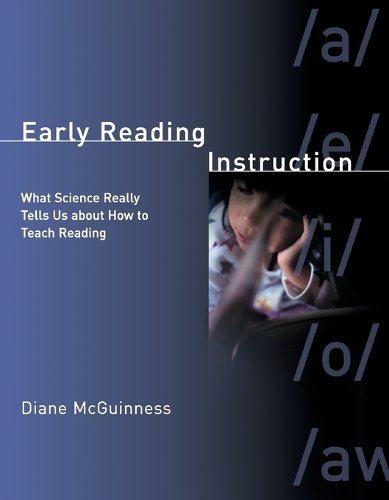
Early Reading Instruction: What Science Really Tells Us about How to Teach Reading
(Paperback)
Publishing Details
Early Reading Instruction: What Science Really Tells Us about How to Teach Reading
By (Author) Diane McGuinness
MIT Press Ltd
Bradford Books
20th January 2006
United States
Classifications
Professional and Scholarly
Non Fiction
Educational: First / native language: Readers and reading schemes
Literacy
Educational: First / native language: Reading and writing skills
372.4
Physical Properties
Paperback
390
Width 152mm, Height 229mm, Spine 25mm
771g
Description
Early Reading Instruction is a comprehensive analysis of the research evidence from early writing systems to computer models of reading. In this book, Diane McGuinness provides an innovative solution to the "reading war"-the century-old debate over the efficacy of phonics (sound-based) versus whole-word (meaning- based) methods. She has developed a prototype-a set of elements that are critical to the success of a reading method.McGuinness shows that all writing systems, without exception, are based on a sound unit in the language. This fact, and other findings by paleographers, provides a platform for the prototype. Other elements of the prototype are based on modern research. For example, observational studies in the classroom show that time spent on three activities strongly predicts reading success- learning phoneme/symbol correspondences, practice at blending and segmenting phonemes in words, and copying/writing words, phrases, and sentences. Most so-called literacy activities have no effect, and some, like sight word memorization, have a strongly negative effect. The National Reading Panel (2000) summarized the research on reading methods after screening out thousands of studies that failed to meet minimum scientific standards. In an in-depth analysis of this evidence, McGuinness shows that the most successful methods (children reading a year or more above age norms) include all the elements in the prototype. Finally, she argues, because phonics-type methods are consistently shown to be superior to whole-word methods in studies dating back to the 1960s, it makes no sense to continue this line of research. The most urgent question for future research is how to get the most effective phonics programs into the classroom.
Reviews
The task of reviewing reading instruction research is daunting and McGuinness's efforts are admirable...Her comprehensive analysis has left few if any stones unturned.
-- Gale A. Mentzer * Education Review *Author Bio
Diane McGuinness is a reading consultant and Emeritus Professor of Psychology at the University of South Florida. She is the author of Why Our Children Can't Read and What We Can Do about It, Early Reading Instruction (MIT Press, 2004), and other books on reading and learning.
